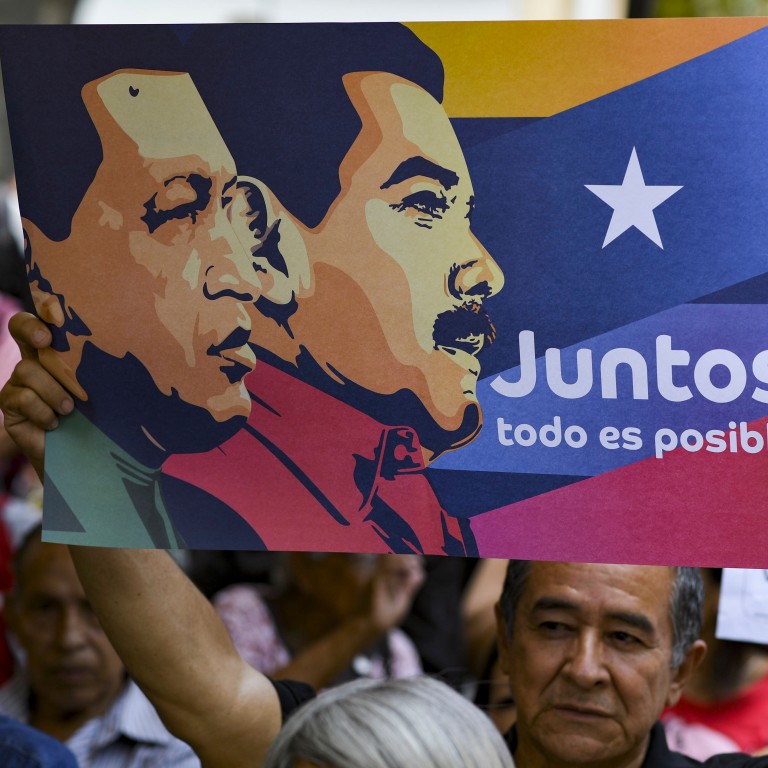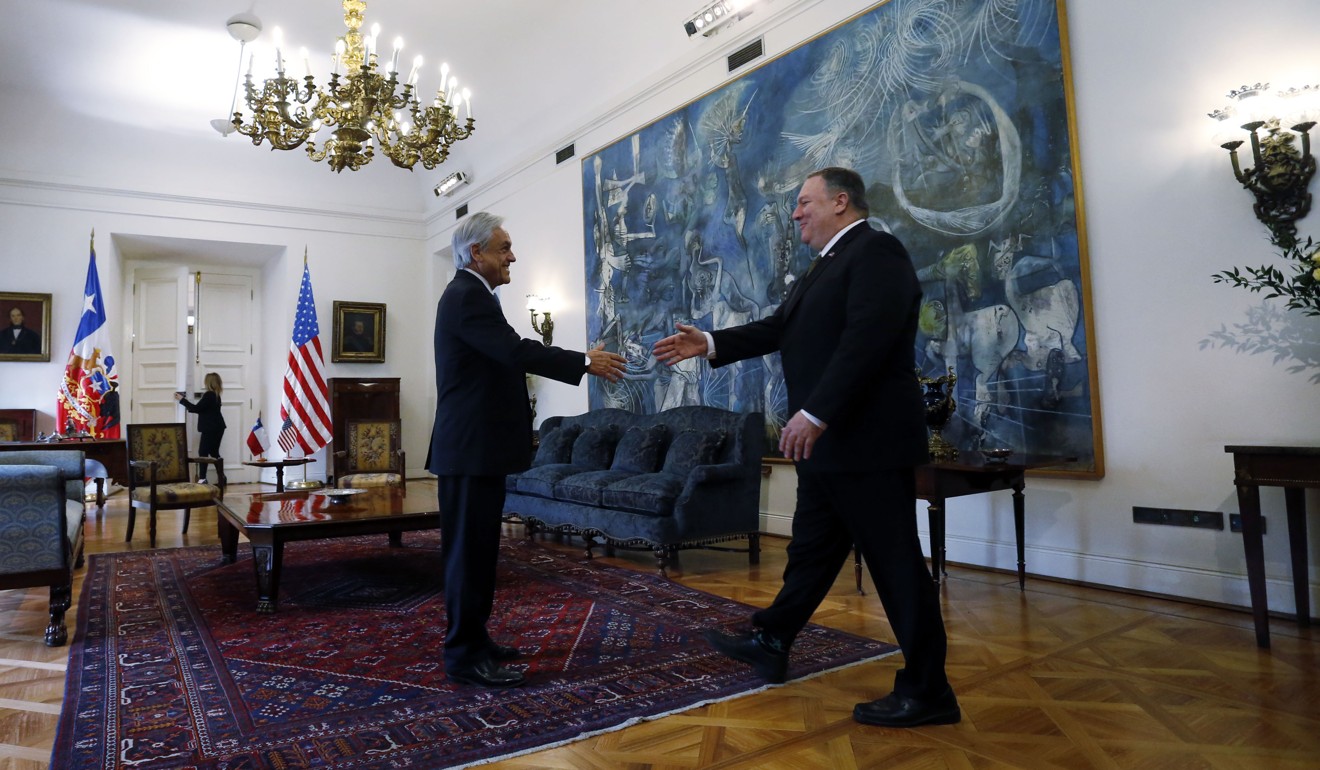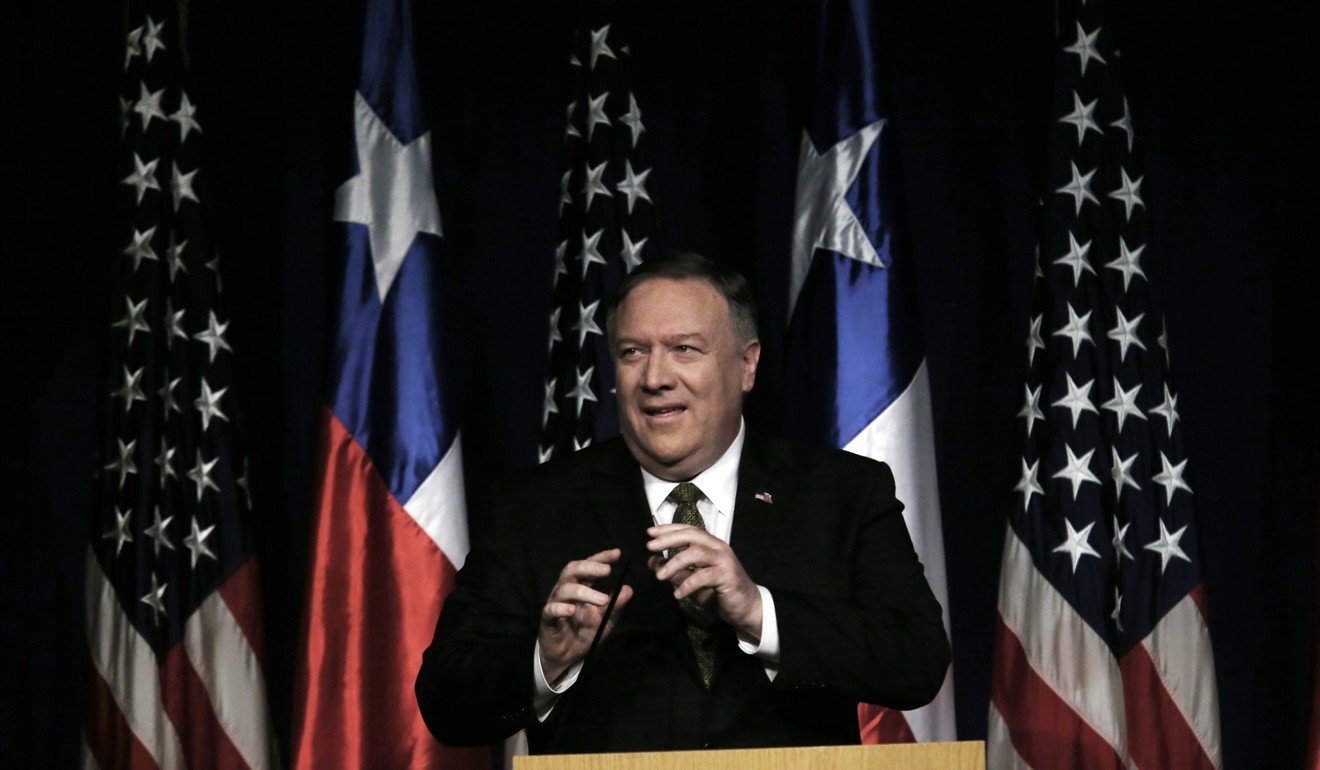
Mike Pompeo accuses China of prolonging Venezuela crisis with ‘hypocritical’ aid to Nicolas Maduro
- US secretary of state met Chile’s President Sebastian Pinera to discuss US-China trade war and other issues
- Without mentioning Huawei, Pompeo warned of systems that could ‘take information from citizens of Chile’ and transfer it to Beijing
US Secretary of State Mike Pompeo said on Friday that China’s financing of President Nicolas Maduro’s government is prolonging the crisis in Venezuela.
Pompeo kicked off a four-country tour of Latin America in Chile, where he met President Sebastian Pinera to discuss the US-China trade war and the Venezuelan crisis.
Hyperinflation, shortages of food and medicine and other hardships have forced more than three million Venezuelans – about one-tenth of the population – to flee the country in the last few years.
“China’s bankrolling of the Maduro regime helped precipitate and prolong the crisis in that country,” Pompeo said, adding that China invested over US$60 billion, “with no strings attached”.

“It’s no surprise that Maduro used the money to use for tasks like paying off cronies, crushing pro-democracy activists, and funding ineffective social programmes,” he said.
“I think there’s a lesson, a lesson to be learned for all of us: China and others are being hypocritical calling for non-intervention in Venezuela’s affairs. Their own financial interventions have helped destroy that country.”
Pompeo said China is a major US trading partner, but that its “trade activities often are deeply connected to their national security mission, their technological goals, their desire to steal intellectual property, to have forced technology transfer, to engage in activity that is not economic”.
I am confident we have a full understanding of both the risks and the opportunities associated with China
“And one of the things we talked about is how we could share information together so that we would know which was which, so that each country could protect its own citizens, so that each country could stay away from occasions where China was acting in malign or nefarious ways while still understanding that trade between our countries is important,” he said.
Pompeo also criticised Russia’s links with leaders in Cuba, Nicaragua and Venezuela.
“Flying in troops and opening a training centre in Venezuela are obvious provocations,” he said. “We shouldn’t stand for Russia escalating an already very precarious situation in that country.”

Pompeo thanked Chile “for being a true leader for the Venezuelan people” in taking in around 300,000 refugees fleeing Maduro’s embattled socialist government.
“I want also to applaud President Pinera for helping isolate Maduro and for showing compassion towards innocent people fleeing the economic and humanitarian crisis in their home country,” he said.
Pinera reiterated Chile’s position that change in Caracas must occur “in a democratic and peaceful way, discarding a military intervention”.
US frustrated at Maduro’s staying power, Russia’s help
The highlight of Pompeo’s trip will be a brief visit Sunday to the Colombian city of Cucuta on the Venezuelan border, where he will meet refugees, after trips to Paraguay and Peru.
All four countries are led by right-wing or centre-right leaders favourable to Washington’s uncompromising approach to Maduro.
The tour is partly aimed at blunting trade rival China’s growing reach in Latin America, where Beijing is Chile’s biggest trading partner, representing 30 per cent of Santiago’s exports – mainly raw materials such as copper and agricultural products. By comparison, the US accounts for only 14 per cent of Santiago’s exports.
The US official said before landing in Chile that the current US administration had “spent a lot of time” in Latin America seeking to improve trade in a region which has turned its back in recent years on a slew of leftist governments.
“This is a historic opportunity,” he told reporters, referring to “a handful of countries that are truly market driven, democratic in ways that we haven’t had in South America for decades. And we think it creates real opportunity.”
Of concern to the US is Chile’s contracts with Huawei, the Chinese tech giant which Washington has long considered a security threat. It has already severely restricted the Shenzhen-based company’s presence in the United States, suspecting its products could be used to spy on Western governments.
Caught in the middle of Venezuela’s power struggle, a worried China weighs its options
While making no direct reference to Huawei, Pompeo said: “Fair, free and open trade is fine.”
But he added: “It is not OK to put technology systems in with latent capability to take information from citizens of Chile or any other country and transfer it back to President Xi [Jinping]’s government.
“Those are the conversations that we had today, and I am confident we have a full understanding of both the risks and the opportunities associated with China.”
Associated Press and Agence France-Presse


.png?itok=arIb17P0)